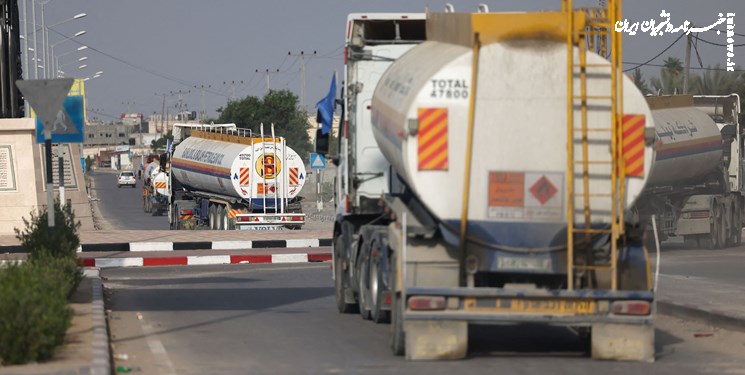to report «iusnews»; Human Rights Watch (HRW) told Al-Jazeera that Israel’s refusal to allow aid into the besieged Gaza Strip is a “war crime”.
“What’s so tragic about the last two weeks is the way in which civilians have been targeted and basic rules about protecting civilians… have been flouted,” Sari Bashi, HRW programme director, said on Monday.
“The fact that Hamas fighters committed war crimes against Israeli civilians does not justify the Israeli authorities committing war crimes against Palestinian civilians and that is what we are seeing right now,” Bashi said.
“The refusal to allow aid into Gaza is a war crime. It is collectively punishing civilians for the actions of fighters. And because nearly half of the people in Gaza are children, it is collectively punishing children for the actions of adult fighters,” Bashi added.
The United Nations Relief and Works Agency (UNRWA) also said that Gaza needs fuel "as urgent as water and food".
Gaza needs fuel “as urgent as water and food", UNRWA Communications Director Tamara Alrifai told CNN on Monday as the two aid convoys that entered Gaza this weekend barely alleviate the dire conditions within the territory.
“Without fuel, it is not going to be possible to go around Gaza. . .or to power the water desalination plant to get clean drinking water or to power hospitals and the lifesaving machines,” Alrifai said.
Alrifai said humanitarian aid that entered Gaza was “a fraction” of what is needed for over 400,000 displaced people currently taking shelters in schools run by UNRWA, adding the situation is “very, very dire”.
She said people in Gaza are forced to ration food, “even counting the minimum required calories per person per day per survival”, adding “We are really counting on a continuous and unimpeded access of the trucks from Rafah into Gaza”.
Israel has previously said that fuel won’t be allowed into Gaza.
Amid a weekend of ramped-up strikes, doctors described “catastrophic” conditions at one central Gazan hospital as electricity and fuel supplies run out and crippled medical facilities rapidly become overwhelmed with casualties.
Dr. Iyad Issa Abu Zaher, director general of Al Aqsa Martyrs hospital, described a “bloody day” for his staff to CNN on Sunday, saying the hospital had received up to 166 bodies and more than 300 injured people.
“It’s impossible for any hospital in the world to admit this number of injured,” he said.
Meanwhile, a relief agency official said that Relief workers in hospitals in Gaza are unable to use morphine or painkillers to treat civilians, as Israel's siege on the enclave drains critical medical supplies amid persistent bombardment.
“What is extremely important are the trauma kits, the surgery kits,” said Leo Cans, the Head of Mission for Medicins Sans Frontieres (Doctors Without Borders) in Jerusalem.
Doctors were “doing surgical operations without the correct dose of narcotics, without the correct dose of morphine," Cans told CNN’s Max Foster.
“In terms of pain management, it's not happening. We currently have people being operated on without having morphine. It just happened to two kids,” Cans added.
“We have a lot of kids that are unfortunately among the wounded, and I was discussing with one of our surgeons, who received a 10-year-old yesterday, burnt on 60% of the body surface, and he didn't end up having painkiller,” Cans said.
“There is no justification at all to block these essential medicines to reach the population,” Cans added.
The UN's experts last week said that Israel's "unspeakably cruel" blockade on Gaza is in violation of international and criminal law.
Cans also acknowledged CNN’s reporting on parents who have resorted to writing their children’s names on their limbs in the event that either they or the children are killed.
Colleagues had told him families were sleeping in the same room because “they want to live together or die together,” he said.
Health workers were also seeing the impact fuel shortages have on the functioning of hospitals and water supplies.
“Fuel is essential for the water plants in order to desalinate to water…If you don’t have fuel, you don't have quality water,” he said, adding many Gazans were now drinking untreated water, leading to outbreaks of diarrhea.
He also called for an end to the “indiscriminate bombing."
“Even war has rules, and you cannot bomb civilians. We have too many children, too many women arriving at the hospital. It is not acceptable,” he added.
Earlier on Sunday Palestinian Ministry of Health in Gaza stated that Gaza’s main medical facility, the Al-Shifa Hospital, is reducing the duration of dialysis sessions for hundreds of kidney patients as electricity and fuel supplies dwindle due to the Israeli blockade.
Out of more than 1,100 kidney failure patients in Gaza, 450 receive treatment at the Al-Shifa hospital, the ministry said.
Security conditions are also making it hard for patients to access hospitals in the strip, Ministry Director General of International Cooperation Marwan Abu Saada said.
The health ministry warned that the electricity and fuel shortages “will lead to a major humanitarian catastrophe, especially for patients with kidney failure.”
It further called on civilians and owners of gas stations in Gaza to donate any fuel they have to hospitals to "save the lives of the wounded and patients".
On October 7, Palestinian resistance movement Hamas launched the largest military operation against the occupying entity in decades, dubbed Operation Al-Aqsa Storm. The resistance movement said that its operation came in response to Israel’s violations at Al-Aqsa Mosque in occupied East Al-Quds and growing settler violence.
Israel launched retaliatory strikes and ordered a complete blockade of the Gaza Strip, home to more than 2 million people, cutting off supplies of water, food and fuel.



